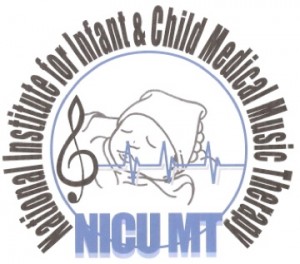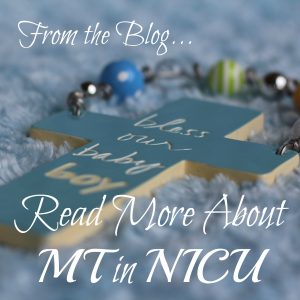Music Therapy in the Neonatal Intensive Care Unit
- Based on research and provided by specially trained music therapists
- Music can mask ambient noise in the NICU environment
- Music pacifies the infant and positively effects oxygen saturation levels, heart rate, and respiration rate
- Music therapy with premature infants can reduce hospital length of stay
- Music facilitates neurological growth and development
- Music therapy promotes parent involvement and care for caregivers
- Music can enhance the NICU environment for medical personnel
Benefits of Music Therapy
- Babies go home an average of 12 days earlier
- Mask ambient noise
- Increased cognitive development
- Increased language development
- Increased parent-child bonding
- Parent education and support
Research Based Interventions
- Music listening to reduce infant stress, increase oxygen and decrease
- Multimodal stimulation paired with live music to increase tolerance to stimulation
- Pacifier Activated Lullaby (PAL) for non-nutritive sucking to increase feeding and reduce pain
Multimodal Stimulation
Auditory, Tactile & Vestibular Stimulation
- Progressive sequence of stimulation paired with live music to increase tolerance to stimulation and homeostasis
- To facilitate neurological growth and development
- To increase oxygen saturation rates
- Appropriate for infants > 32 weeks
- Helps babies go home earlier
- Saves hospitals money by reduction in hospital length of stay
PAL®: Pacifier Activated Lullaby
- To facilitate non-nutritive sucking endurance and effectiveness
- To decrease pain perception through non-nutritive sucking release of endorphins
- Appropriate for infants of 34 weeks, being weaned from feeding tubes, demonstrating apnea or early fatigue, or followings painful procedures to teach non-nutritive sucking for pain relief
- An FDA-approved device that uses music to help premature babies learn to suck and feed
- Helps babies learn to suck, increase weight gain, and go home earlier
- Saves hospitals money by reduction in hospital length of stay
- Produced by Powers Device Technologies, Inc. and available worldwide
“The Pacifier Activated Lullaby (PAL®) device was created to help address one of the greatest difficulties many of these babies experience – learning the proper muscle movements to be able to suck and feed.
The brainchild of Professor Jayne Standley, the PAL® device uses a specially wired pacifier and speaker system to play a soft lullaby each time a baby completes a successful sucking motion.” (http://www.research.fsu.edu/pal/about.html)
Preemies who use PAL® experience:
- Earlier transition to oral feeding
- More rapid weight gain
- Reductions in hospital length of stay
- Improved behavioral state control
- Decreased stress
- Enhanced maturation of neural systems
Information from Powers Device Technologies:
Read MorePAL® stimulates non-nutritive sucking and the breathe-suck-swallow reflex through the use of music therapy.
Non-nutritive sucking is an essential life skill for infants – without this skill, babies do not know how to feed, and thus their survival is significantly compromised. But premature infants come into the world too soon to achieve this major developmental milestone. The development of non-nutritive sucking begins at for fetuses at 28 weeks, but continues to develop through weeks 32 to 24. When babies are born pre-term, this development is abruptly stopped. The survival of premature babies relies upon them being taught how to suck productively and develop the breathe-suck-swallow reflex outside of the womb.
PAL® is critical in overcoming this challenge. Capitalizing on a baby’s natural appetite for music, the PAL® uses lullaby therapy to stimulate non-nutritive sucking.
Specialized Training in NICU MT:
 “Premature infants are extremely fragile with many beginning their treatment at a basic survival level. Handling and interaction can be harmful to their care and must be carefully designed to promote the medical/developmental goals of NICU treatment, especially when adding non-essential stimuli such as music. Evidence-based music therapy treatment in this most critical setting is based on information about the needs of the infants, medical and developmental goals of NICU care, and music therapy protocols documented in refereed research literature. This 30-hour specialized training course awards a Certificate of specialized training and use of the initials NICU MT designating competency achievement to practice evidence-based clinical services in this very critical and highly specialized environment. The institute maintains a list of individuals completing this training as a service to the medical community.”
“Premature infants are extremely fragile with many beginning their treatment at a basic survival level. Handling and interaction can be harmful to their care and must be carefully designed to promote the medical/developmental goals of NICU treatment, especially when adding non-essential stimuli such as music. Evidence-based music therapy treatment in this most critical setting is based on information about the needs of the infants, medical and developmental goals of NICU care, and music therapy protocols documented in refereed research literature. This 30-hour specialized training course awards a Certificate of specialized training and use of the initials NICU MT designating competency achievement to practice evidence-based clinical services in this very critical and highly specialized environment. The institute maintains a list of individuals completing this training as a service to the medical community.”
From the website: http://music.fsu.edu/Areas-of-Study/Music-Therapy/Certifications/NICU-MT
Free Resources:
For Parents in the NICU (pdf)
How Can Music Help My Preemie? (pdf)
Info for Hospitals about Music Therapy in the NICU (pdf)
For More Information:
For more information about the National Institute for Infant and Child Medical Music Therapy click here.
For more information about the Pacifier Activated Lullaby (PAL) click here.
Music Therapy with Premature Infants: Research and Developmental Interventions, Second Edition by Jayne M. Standley, Ph.D., MT-BC; 2010, American Music Therapy Association
Music, Medicine & Miracles by Amy Robertson, MM, MT-BC, NICU MT; 2009, Florida Hospital Healthcare & Leadership Monograph Series, Vol 3.
45 Hospitals with NICU Music Therapy or Supportive Music, Kat Fulton:http://www.rhythmforgood.com/2010/02/hospitals-with-nicu-music-therapy-programs-around-the-world/

